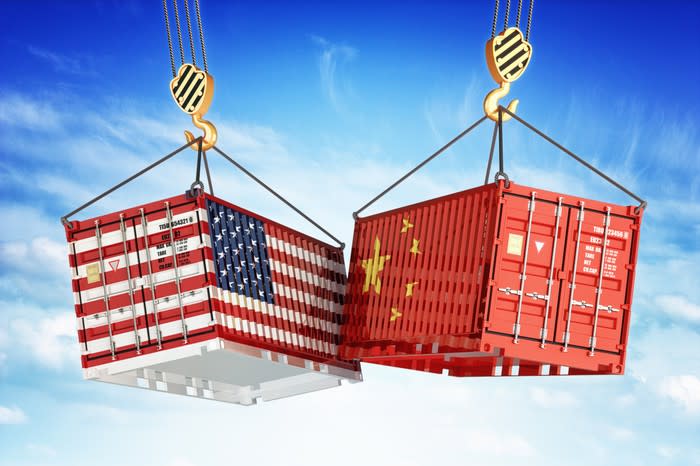Trade War Pain Comes to Cisco Systems
Networking hardware provider Cisco Systems (NASDAQ: CSCO) continued its streak of posting solid revenue and earnings growth when it reported its fiscal fourth-quarter results on Wednesday, but management's guidance made it clear that the macroeconomic environment is starting to extract a toll. Cisco's business in China was hammered, and the company's outlook fell short of analysts' expectations.
A solid quarter
Cisco topped analysts' expectations, posting solid mid-single-digit percentage revenue growth and double-digit percentage adjusted earnings growth:
Metric | Q4 2019 | Change (YOY) | Compared to Analysts' Consensus Estimate |
|---|---|---|---|
Revenue | $13.4 billion | 4.5% | Beat by $40 million |
Non-GAAP (adjusted) earnings per share | $0.83 | 18.6% | Beat by $0.01 |
Data source: Cisco Systems.
Excluding revenue from its divested service provider video software solutions business, Cisco's revenue grew by 6% year over year.
Product revenue grew 7% to $10.1 billion, while services revenue grew 4% to $3.3 billion. All of Cisco's major product categories reported growth: Infrastructure platforms revenue rose 6% to $7.9 billion; applications revenue rose 11% to $1.5 billion; and security revenue rose 14% to $714 million.
Geographically, the Asia-Pacific region was a weak spot for the company: Revenue from that part of the world tumbled 5% to $2 billion. CFO Kelly Kramer disclosed during the earnings call that revenue from China was down 25% in the quarter. And while China is not a hugely important market for Cisco, accounting for less than 3% of its total revenue, the decline was large enough to noticeably impact the company's overall results.
Cisco CEO Chuck Robbins described the company's problems with state-owned enterprises in China:
We're just being -- we're being uninvited to bid. We're not being allowed to even participate anymore. So those are the enterprises. That's where the large impact was this past quarter. So it was, it was just a much faster decline of what we candidly expected.
One thing that will boost Cisco's revenue a bit in fiscal 2020 is the pending acquisition of Acacia Communications, which is expected to close in the fiscal second quarter. The optical networking company produced revenue of $418 million in the trailing 12-month period.

No-so-solid guidance
Cisco expects its revenue to be in the range of flat to 2% higher year over year in the first quarter of its fiscal 2020, excluding the divested SPVSS business. That business produced revenue of $168 million in fiscal Q1 2019. Non-GAAP EPS is expected to land between $0.80 and $0.82.
Both of those guidance ranges were below analysts' consensus expectations for revenue of $13.41 billion, and non-GAAP EPS guidance of $0.83.
Macroeconomic issues began to drag on Cisco in July, and that impact is carrying over into the current quarter. On the earnings call, Robbins said:
We just had a little bit in July of a feel that we just didn't close as strong as we would like. And so we felt like there was even more that we could have done. And it just didn't feel like a normal Q4 finish and it felt a little bit like some of the macro issues, maybe manifesting themselves.
The trade war between the U.S. and China may not be having too much of a direct effect on Cisco's business, but it is having an indirect effect. Any economic uncertainty can lead its customers to delay orders.
Cisco has become more diversified in recent years, growing its footprint in software-heavy businesses like collaboration and security. But the core networking hardware business still generates most of its revenue, and that is highly sensitive to global economic conditions. With the U.S.-China trade war raging, investors can expect Cisco's results to look less impressive for the time being.
Timothy Green owns shares of Cisco Systems. The Motley Fool has no position in any of the stocks mentioned. The Motley Fool has a disclosure policy.
This article was originally published on Fool.com

 Yahoo Finance
Yahoo Finance 